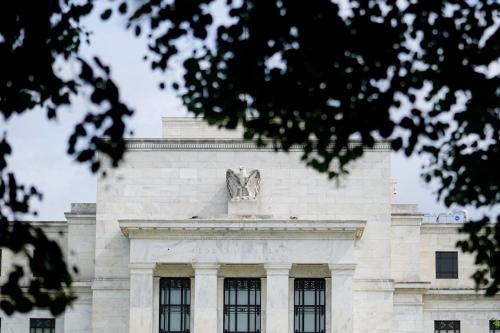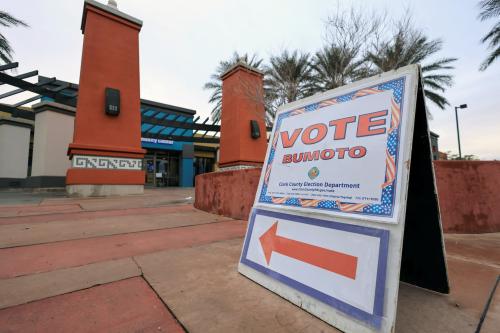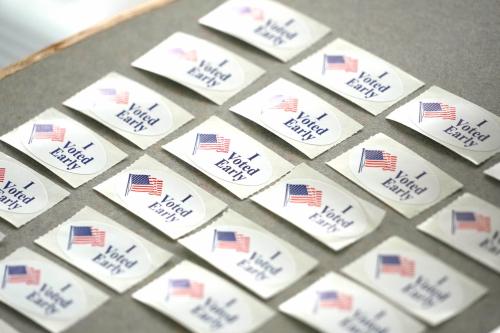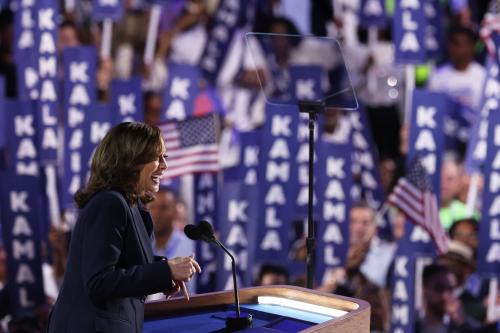Michigan is once again a key battleground state in this year’s presidential election. Donald Trump won the state in 2016 by 10,704 votes, while Joe Biden won the state in 2020 by 154,188 votes. This year, pundits and candidates across the aisle appear to agree on only one basic fact: The race is still very close, and Michigan’s 15 electoral college votes are still up for grabs.
Since Biden stepped down at the end of July, Harris has enjoyed a steady—albeit at times uncomfortably thin—lead over Trump in Michigan. However, polling from the end of September onward suggests that Harris comfortably winning the state on November 5 is not a foregone conclusion. With just three weeks left to go in the 2024 presidential race, the polling website FiveThirtyEight indicates that as of October 24, 2024, Kamala Harris is ahead of Donald Trump in Michigan by only 0.6 points—47.6 compared to 47.0. This narrowing of the race appears to be closing the gap that Harris gained over Trump in August. Diving deeper into specific polls feeding into these estimates, it becomes clear that while Harris maintained a solid and consistent lead over Trump by between one and up to eight percentage points in the middle half of September, polls from the third week of September onward have either had Trump leading the state, Harris winning the state by a slim margin, or the two of them being evenly split.
What might be driving this change? A September 2024 New York Times/Siena College poll found that the three issues Michigan voters cared most about were the economy (24%), abortion (17%), and immigration (14%). Trump, for one, has campaigned heavily in recent weeks about two of these three issues. For instance, he has appealed heavily to Michiganders whose jobs were lost to globalization and automation, by promising to revive the American car industry and bring back car factories that have closed in recent years. Groups like Duty to America are highlighting Trump’s strengths on illegal immigration by airing ads across Michigan arguing that it has hurt white people who have been “left behind.” And, while Harris, on the other hand, has great strengths on abortion rights, success in the 2022 elections in amending the state constitution to secure the right to abortion and other reproductive health services may have reduced abortion’s importance as a central voting issue in the state.
In contrast, there appear to be several issues pertaining to three vital Democratic constituent groups in the state—Black voters, young voters, and Muslim/MENA voters—which are further complicating a seamless Harris victory in Michigan.
Among Black voters, Wayne State University political scientist Ronald Brown has identified an enthusiasm gap between those who are part of the “black leadership class” and deeply connected to the Democratic Party and those Black Michiganders without those same connections, who are more working class, poorer, more fatigued, less interested, and therefore more susceptible to sitting out elections.
Many Black voters are also deeply concerned about the economy, and as Michigan State University political scientist Meghan Wilson has noted, Harris could attract Black business owners and holders of student debt by discussing plans to infuse capital into small businesses. The Harris campaign appears to agree. This week, Harris is not only unveiling economic proposals appealing to Black voters but will also be traveling to Detroit to participate in a radio town hall with Charlamagne Tha God, whose program The Breakfast Club has a nationwide audience, much of whom is Black. But attention should be paid to one particular effort to stifle Black turnout. Recently, it was revealed that Tom Barrett, a GOP candidate for the U.S. House, ran a newspaper advertisement in the Black-owned newspaper Michigan Bulletin that incorrectly informed the readership, most of whom are Black, to vote on November 6, when Election Day is on November 5.
Young voters in Michigan present a potential stream of untapped support for the Democratic Party. Though young voters have historically turned out at lower rates than older Americans, young voters in Michigan stand out from their peers. Fifty-four percent of Michiganders 18 to 29 years old voted in the 2020 election, a 20% increase from 2016. In the 2022 midterms, when young voters aged 18 to 29 in Michigan recorded the highest voter turnout in all the country, they demonstrated how impactful their votes were in enshrining abortion and voting rights in the state constitution. That year, about 75% of students who were registered voters at the University of Michigan and Michigan State University cast ballots.
This year, however, how successful Harris has been in activating the youth vote remains to be seen. Certainly, young Michiganders are more enthusiastic about her candidacy than they were Biden’s, but recent analyses by Michigan State University political scientist Corwin Smidt indicate that so far youth turnout in Michigan’s November 2024 election lags behind their 2020 levels. What’s more, young voters were a key part of the “uncommitted” coalition who sent a strong message to then presidential-nominee Biden over his enabling of the Israeli war in Gaza during the February 2024 primary election. But Harris is making strides to connect with young voters by establishing offices at campuses across the state. Importantly, young voters could not only shape the outcome of the presidential election, but also the partisan balance in Congress, given that young voters at Michigan State University will have the opportunity to cast a ballot in the race for Michigan’s 7th Congressional District, which is among the 26 tossup districts in the country.
Finally, Harris is in a deeply precarious position vis-à-vis Michigan’s Muslim and MENA electorate. Without a doubt, these groups will have an outsized impact in deciding how Michigan’s 15 electoral college votes will be cast. According to political scientist Youssef Chouhoud, Michigan is home to more than 200,000 Muslim registered voters. Over the past year, Muslims’ support for the Democratic Party has plummeted. In a recent poll fielded between August 25 and August 27, the Council on American Islamic Relations found that Jill Stein is leading Muslim voters in Michigan; 40% of Muslims surveyed in that poll supported Stein, 18% supported Trump, and only 12% supported Harris. And, as Harris’ support for Israel remains steadfast while Israel continues its assaults on Gaza and now Lebanon, she has arguably alienated these voters who could have been a reliable source of electoral support for her.







Commentary
The state of elections in Michigan
October 24, 2024